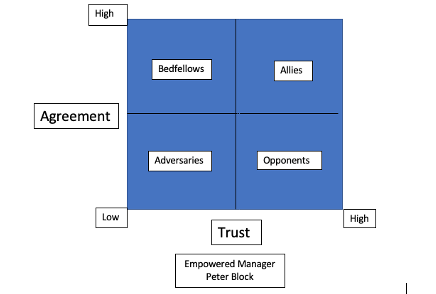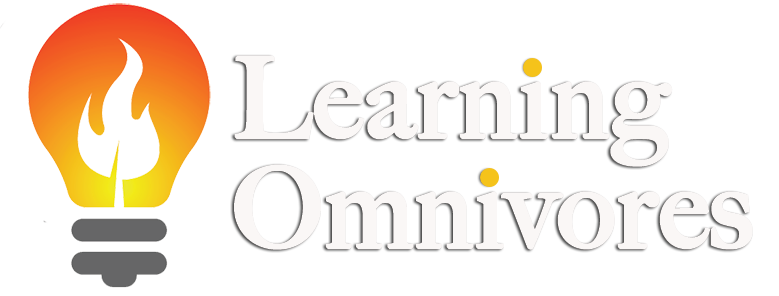Iron Underwear
Educators have asked me, ‘how does someone turnaround schools?’ My answer is, “put on Iron Underwear. You will get eaten from all sides.” Then, my response is, you better know what you believe in, where are your bottom lines, and be able to articulate why you take certain actions. Most organizations and the communities are looking for the next savior. This is hard work and requires working ‘inside the box.’ The beginning point is understanding what is working, not working, and who are the efficacious players.
I = Identify what is going on, who are the learners, and what processes are boosters and barriers? Peter Block (1987) in his book, Empowered Manager suggested to find out who are the adversaries, allies, bedfellows, and opponents?

Adversaries – Yes you have to deal with them. Restrict the time you spend with them. “Never spend time with people who don’t respect you” Maori Proverb
Bedfellows – they will be with you as long as they get what they want.
Opponents –These are staff that high trust exists and will give straight opinions if there is disagreement. The best source of real issues.
Allies – Too often overlooked since there is agreement and trust. Spend time with them.
R = Reframe negative outcomes and redirect the resources of time and energy to what is producing positive outcomes. Pareto Principle, aka 80/20 rule. This says 80% of positive outcomes are from 20% of your efforts. Expand the initiatives that are showing positive results. CAUTION: Don’t let 80% of your time get only 20% return on investment (ROI). Hemingway said, “Never mistake motion for action.”
O = Options. Be creative in applying new ways of thinking and acting. Bureaucracies and status quo cannot keep pace with creativity. Be Open to ideas. As Richard Sheridan, Menlo Innovations says, “Run the Experiment.” See what happens. Once results are in use the ‘Reverse Las Vegas Effect.’ If it works – tell everybody. If it doesn’t work – tell everybody.
N = Non-Negotiable. What is the line a leader will not cross? Know this before having to confront that line. When a leader is in a conflict situation is not the time to decide what you believe. What are you willing to get fired for? Some of mine are with resources for deeper understanding:
- Equity Issues (Kendi and Akbar)
- Habits of Mind (Costa and Kallick)
- Radical Transparency and Radical Open-mindedness (Ray Dalio)
- Psychological Safety (Edmondson)
- Professional Collaboration (Hargreaves and O’Connor)
- Responding to Resistance (Sommers)
U = United in vision, mission, and values. What supports you in times of change? What is closest to you? Underwear.
Vision: Where do we want to go?
Mission: How will we get there?
Values: How will we behave as we work toward our vision.
Angeles Arrien (1993) wrote a book called The Four-Fold Way. I recommend this highly and is still one of the top three resources that influences my thinking. Here are the four tenets which are adaptable to leadership.
- Show Up and Be Fully Present. A leader must be visible, talk to staff, students, and community. Make connections. Find out what is going on in schools or organizations from the people on the front lines.
- Pay Attention to What Has Heart and Meaning. Leaders’ today are demand attractors. If someone wants something, find the leader and make a demand. Visualize a leaders coat or shirt covered with sticky notes. Leaders must sort to find the most important issues and leverage those solutions to make organizational life better
- Tell the Truth Without Blame or Judgment. Very difficult. Most people, including me, want to put their own spin on events and plans. Speak truth and be open to others thinking. Consider there may be other perspectives on truth. Words Matter. Choose and use them carefully.
- Be Open to Outcome. I add, be open to how to get to the outcomes. When decisions and changes are made, sometimes intended consequences happen. That is the good news. The no-so-good news is unintended consequences happen. Staying open to midcourse corrections help guide actions to get the best results.
When a new leader is coming on board in the organization, many times people have retreated to their rooms for safety. They are looking for stability and safety. They can control the four walls of their room. Outside their rooms and offices, there is a feeling of less control. Staff has experienced ‘Repetitive Change Syndrome’ many times in their career. The promise of the ‘silver bullet’ rarely gets long-term correction. The world and life changes, therefore, we must remain open to change. There are no silver bullets, only hard work and commitment.
Transformation is a result of caring, sharing, and daring to face change is necessary. Work to support change with those who dare to challenge the system. Leaders must protect the ‘learning omnivores’ who are in every school and organization, so they will share with others their failures and success.
Let’s change the “F” word from failure to feedback. Kierkegaard said, ‘we understand looking back, unfortunately we must live life forward.’ Marshall Goldsmith coined the term FeedForward. You can’t change the past. Learn from it and plan the next move forward.
I highly recommend the book American Icon (2012). This is a story of Alan Mulally who turned around Boeing and Ford. There are good lesson to learn from this resource.
I wish you well on your journey.
References:
Akbar, Maysa. (2020). Beyond Ally. Hartford CT: Publish Your Purpose Press.
Arrien, A. (1993). The four-fold way: walking paths of the warrior, teacher, healer, and visionary. New York: HarperCollins.
Block, P. (1987). The empowered manager. San Francisco: Jossey-Bass Publishers.
Costa, Arthur, & Kallick, Bena. (2008). Learning and Leading with Habits of Mind: 16 Essential Characteristics for Success. Alexandria, VA: ASCD Publications
Edmondson, Amy. (2019). The Fearless Organization. Hoboken, NJ: John Wiley & Sons
Hargreaves, Andy & O’Connor, Michael. (2018). Collaborative Professionalism. Thousand Oaks: Corwin Press
Hoffman, Bryce. (2012). American Icon. New York: Crown
Kendi, Ibram X. (2019). How to be an Antiracist. New York: Penguin.
Sheridan, Richard. (2018). Chief Joy Officer. New York: Portfolio/Penguin
Sommers, William. (2018). Responding to Resistance: 30 Ways to Manage Conflict In Schools. Bloomington, IN: Solution Tree
Sommers, William (2021). Creating Talent Density. Lanham, MD: Rowman Littlefield
